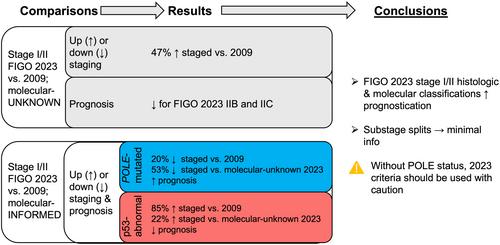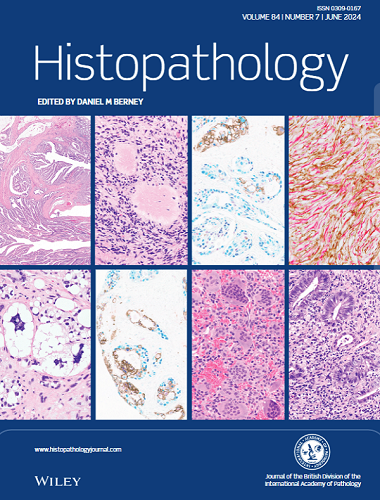Prognostic performance of FIGO 2023 endometrial carcinoma staging: a comparison to FIGO 2009 staging in the setting of known and unknown molecular classification
Abstract
Aims
The 2023 FIGO staging criteria for endometrial cancer (EC) introduced marked changes from the 2009 version. The full implication of these changes for patient diagnosis and treatment is unknown. We evaluate the differences in staging and prognostication between the two systems, with and without inclusion of molecular classification.
Methods and results
We assigned (1) FIGO 2009, (2) 2023 molecular-agnostic and (3) 2023 molecular-informed stages to 404 fully staged and molecularly classified patients with EC. Disease-specific and progression/relapse-free survival were analysed via the Kaplan–Meier method and compared with log-rank testing; 118 of 252 (47%) FIGO 2009 stage I patients were upstaged based on histopathological findings alone. Stage I/II subgroup survival distribution analysis showed a worse prognosis in FIGO 2023 IIB and IIC patients. In the molecular-informed FIGO 2023 system, three of 15 (20%) POLE-mutated stage I/II cases were downstaged from FIGO 2009 and eight (53%) were downstaged from molecular-agnostic FIGO 2023. Fifty-one of 60 (85%) p53-abnormal tumours were upstaged from the FIGO 2009, whereas 13 of 60 (22%) were upstaged from the 2023 molecular-agnostic stage. Molecular classification improved prognostic stratification for both 2009 and 2023 FIGO systems.
Conclusions
Downstaging based on POLE mutation more accurately represents patient outcomes. However, in the absence of known POLE status, applying molecular-agnostic FIGO 2023 criteria for stage I/II disease should be conducted with caution. For aggressive histotypes, additionally reporting FIGO 2009 stage should be considered. Upstaging based on substantial lymphovascular space invasion, aggressive histotype with any myometrial invasion and abnormal p53 improves prognostic discernment. Further subdivisions within stage I/II provide minimal additional prognostic information.


 求助内容:
求助内容: 应助结果提醒方式:
应助结果提醒方式:


